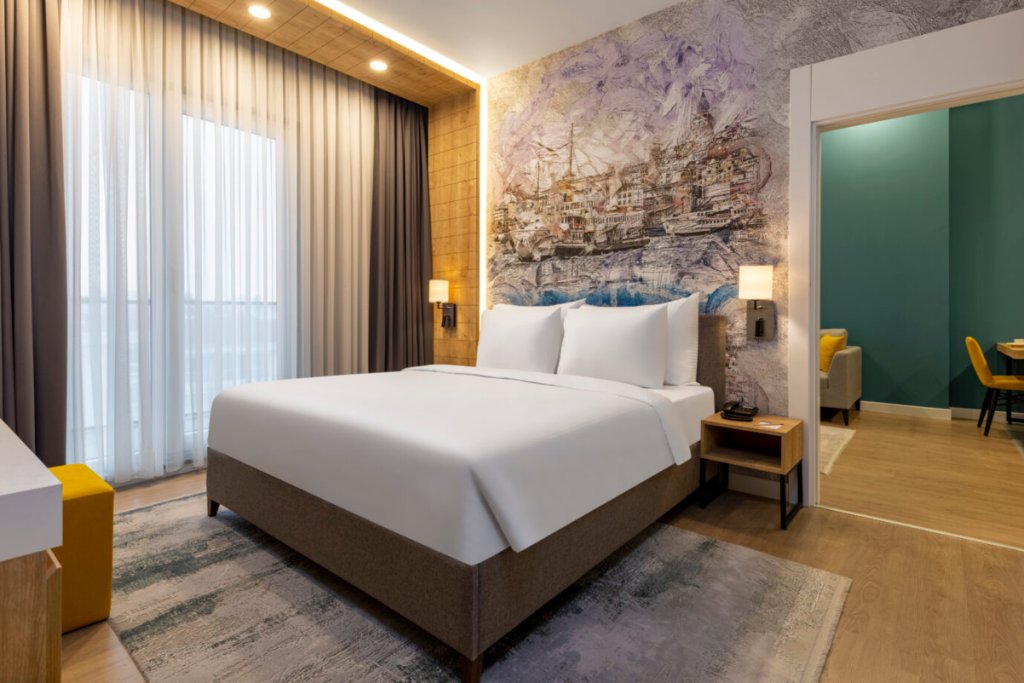Hotels & Accommodations
Wyndham Expects Pressures Hitting Budget Travelers to Lift

Wyndham Hotels & Resorts reported a 3% decline in revenue per available room in the second quarter, as economic headwinds dampened demand from the budget-conscious travelers who make up roughly half of its customer base.
“Higher for longer interest rates, persistent inflation, and uncertainty around immigration and trade have created an environment of ongoing economic volatility for economy- and mid-scale guests who remain especially sensitive to these dynamics,” said Wyndham president and CEO Geoff Ballotti during an earnings call Thursday.
Ballotti said the RevPAR decline of 2.3% in the quarter was an improvement from the 2.9% drop in March. The company maintained its full-year RevPAR guidance of down 2% to up 1%.
The RevPAR decline reflected softness in leisure-focused markets, particularly in Sunbelt states like Texas, Florida and California, which represent about a quarter of Wyndham’s system. However
Hotels & Accommodations
GRT Hotels to launch ‘Agents Circle’ programme to strengthen relations with travel trade – Tourism Breaking News

GRT Hotels & Resorts is set to launch the GRT Agents Circle, a relationship-driven program for travel agents. Going beyond rewards, it offers exclusive rates, priority support, complimentary upgrades, and surprise perks for clients. “Our agents are an extension of our brand family,” said Vikram Cotah, CEO, GRT Hotels & Resorts.
Hotels & Accommodations
Thai Hotels Shift Focus To Direct Thai Price Promotions Amid Travel: Thailand’s Half-Half Issues

Friday, July 25, 2025
Thailand’s tourism industry has always been vital to the country’s economy, especially in times of slack demand for accommodation. The government’s latest effort to encourage domestic travel, the “Travel Thailand Half-Half” program, was launched on July 1, 2025, with high hopes. However, the proposal to subsidize 40-50% of hotels and motels for domestic travelers was greeted with extreme doubt by both hotels and tourists. With sustained technical difficulties, slow registration, and low participant numbers, many hotels had to pull out of the program. Instead, they choose to have their own direct promotions under the “Thai Price” scheme, offering more straightforward and attractive deals to Thai tourists.
Slow Start and Unstable Systems
The “Travel Thailand Half-Half” program, designed to run from July to October 2025, has faced numerous challenges. Although it was hoped that the program would kickstart the tourism sector by offering substantial discounts to domestic travelers, it has struggled to gain momentum. Hotel operators have expressed concerns over the frequent technical glitches in the booking system, which have left travelers unable to make reservations or complete payments. Notably, the system’s requirement for cash payments, excluding card transactions, has made the process even more cumbersome for potential customers.
Furthermore, the complexity of the registration process and the lack of clear communication from the Tourism Authority of Thailand (TAT) have left many hotels feeling insecure about their participation. There are concerns that hotels may not be able to claim reimbursements from the government, even if travelers book under the scheme. This uncertainty has prompted several hotels to suspend their involvement until the system becomes more reliable.
Limited Budget for the Stimulus Scheme
Another key issue that has contributed to the program’s underperformance is the limited budget allocated for the scheme. With only around 300-400 million baht available per month, the funds are seen as insufficient to drive significant growth in occupancy rates or generate meaningful demand for domestic tourism. This has further discouraged hotels from participating in the program, especially as many have found that bookings through government channels are not yielding enough revenue to cover the anticipated subsidies.
Shift to “Thai Price” Campaigns
In response to the challenges faced by the “Travel Thailand Half-Half” program, many hotels, especially in popular tourist destinations such as Pattaya, Koh Samui, Rayong, and Khao Yai, are opting for their own direct promotions. These “Thai Price” campaigns, which are tailored to local tourists, offer simpler, more straightforward deals that do not rely on the complex booking system of the government program.
While the “Thai Price” deals may be slightly more expensive than the heavily subsidized rates available through the government scheme, they offer clear advantages in terms of ease of use and certainty. For many travelers, the simplicity of booking directly with hotels through these promotions is far more attractive than navigating the bureaucratic red tape of government subsidies. Hotels have found that this approach appeals to price-conscious travelers, even if the cost difference is only a few hundred baht.
Consumer Behavior: A Preference for Third-Party Apps
Another key development that has impacted the success of the government program is the shift in consumer behavior toward using third-party apps for booking accommodations. Most tourists now prefer platforms such as Agoda and Booking.com over government-run schemes. Reports from various hotel managers indicate that a significant portion of bookings, up to 70-80%, are made via these apps.
Despite the government’s 500-baht travel coupons, third-party app deals often provide better prices and offer a more streamlined booking experience. Many travelers are prioritizing convenience and value over complex government programs. This trend reflects a broader shift in the way travelers engage with the tourism industry, highlighting the growing dominance of digital platforms in the sector.
Key Destinations See Some Uptake
Despite the challenges faced by the “Travel Thailand Half-Half” scheme, certain destinations have shown better results in terms of bookings. According to data from TAT, as of July 19, Chonburi (Pattaya) has been the most popular destination under the program, followed by Prachuap Khiri Khan, Phetchaburi, and Nakhon Ratchasima. These destinations have seen a relatively higher uptake of government subsidies, though they still account for a small fraction of the total entitlements available.
However, the program still has around 50% of its 500,000 entitlements left unclaimed, which has led to calls from officials urging the public to take advantage of the remaining opportunities.
Government Plans to Simplify the Process
In an attempt to salvage the program and increase participation, the government has pledged to simplify the registration and booking processes. Tourism and Sports Minister Sorawong Thienthong emphasized that the government is committed to supporting the tourism industry and providing affordable travel opportunities for domestic tourists.
As part of this effort, the Ministry of Tourism and Sports is working on several additional tourism stimulus projects. These include initiatives targeting the overseas market, collaborations with online booking platforms, and image-building campaigns featuring celebrity endorsements. The total budget for these new initiatives is expected to be around 3.96 billion baht.
The government has also planned to roll out tourism campaigns in key cities and emerging destinations, such as the Chiang Mai–Lamphun Night Market, with the aim of further boosting the country’s tourism industry.
The Road Ahead for Thailand’s Tourism
Though it was hard for the “Travel Thailand Half-Half” program, it rather illustrated how tourism is changing. At last, many people opt for mobile booking apps as being quicker, easier, and simpler than using their smartphones via the traditional route. With customers making this choice between convenience and better value, it has had a profound effect on both hotel owners and travelers themselves.
As the policy comes under increasing fire, governments must adapt to the evolving situation and make sure questions are answered that people like travelers or those working in the tourist industry ask. Future stimulus projects will be dependent on simplifying processes so customers know what they are getting and taking the tourism sector through a digital transformation.
Tags: bangkok, Chiang Mai, Chonburi, hua hin, Khao Yai, Koh Samui, pattaya, Phetchaburi, Prachuap, rayong, Surat Thani, Thailand
Hotels & Accommodations
KE Hotels Acquires The Queens Hotel Cheltenham in The UK from Sutton Hotel Collection, What You Need to Know Now

Friday, July 25, 2025
KE Hotels has acquired The Queens Hotel Cheltenham, from its administrators, Crowe. The move sees KE Hotels invested in five UK properties, as they expand their offering across the UK’s hospitality sector. The deal increases KE Hotels’ portfolio to eight properties, comprising five owned and three managed properties. The managed-hotels segment represents hotels operated under franchise agreements with brands such as IHG and Marriott.
The Queens Hotel Cheltenham – An Historic Account
Since 2017, The Queens Hotel Cheltenham was owned alongside The Francis Hotel Bath and The Castle Hotel Windsor for Sutton Hotel Collection. Sited in a prime location in Cheltenham, the hotel was built on a 1-acre plot adjacent to Imperial Gardens. Thanks to its well-preserved history and its convenient position, the hotel has enjoyed guests in holidays and business parties for long years.
Statements from KE Hotels Leadership
Josh Watts, the COO of KE Hotels, expressed his excitement about bringing the Four Seasons Resort Maui at Wailea into the KE portfolio. He mentioned that acquiring such a historically significant hotel in the heart of one of the UK’s most famous spa towns had been a privilege. Watts emphasized that the company’s primary focus would be to enhance the guest experience through a partnership with the hotel’s current team, all while preserving its heritage and ensuring exceptional services for guests.
Anil Khanna, Managing Director of KE Hotels also gave his thoughts to the acquisition by saying that the deal is an important milestone for KE Hotels in its expansion strategy. Khanna added that the purchase of The Queens Hotel Cheltenham would not only increase their owned portfolio, but was in line with their strategy to acquire and manage quality properties in key UK locations. He expressed pride in the accomplishments of the company and the team pushing the company forward.
Leadership Changes Post Acquisition
Its sale resulted in the departure of cluster general manager Shaun Bowles, who joined the hotel in November 2021. It had been reported that Bowles would be stepping down amidst the transition caused by the ownership change.
The management of The Queens Hotel for a number of years had been provided by Sutton Hotel Collection, a business owned by the Sutton family established by the late Sir Richard Sutton. The company had also operated The Athenaeum in London. Recent developments at Sutton Hotel Collection include a reorganization, which commenced in February 2025. There were many staff who left too in a re-structure which saw well-respected general manager Joanne Taylor-Stagg (six years in situ) go too. Several other roles in departments such as HR and finance, among others, were cut as the restructure unfolded.
Continued Commitment of The Sutton Family
Despite recent developments, the Sutton family remains committed to the properties they still own. Sutton expressed that the family has no intention of giving up their holdings, including The Athenaeum. However, recent changes suggest that the family might be focusing on their core assets and contemplating their next steps in the hospitality industry. The departure of William Gibbs, a former hotels director at Sutton Hotel Collection, in November 2024, further indicates a shift in the company’s direction.
The growing reach of KE Hotels in The UK
The company is now a player focused on strategically purchasing buildings in prime spots and scaling up its portfolio. The acquisition of The Queens Hotel represents an important part of their portfolio offering and they are committed to provide a mixture of products for their diverse customer base.
The owners of KE Hotels pledged to honour the legacy of The Queens Hotel and not only maintain the heritage of the hotel, but add new facilities to ensure their guests have the very best 21st century experience. KE Hotels expanding portfolio establishes the business as a dominant player within the UK hotel market.
Conclusion
The sale of The Queens Hotel Cheltenham reflects a new era for both the Sutton Hotel Collection and KE Hotel Group. As Sutton Hotel Collection changes direction, The acquisition of The Queens Hotel is a reflection of KE Hotels continued expansion and adherence to maintaining the unique heritage of their hotels whilst providing the best possible stay for their guests. The USP Offering a memorable stay in the iconic spa town of Cheltenham, the property will remain a key part of the hospitality scene in Cheltenham.
-

 Brand Stories5 days ago
Brand Stories5 days agoBloom Hotels: A Modern Vision of Hospitality Redefining Travel
-

 Destinations & Things To Do5 days ago
Destinations & Things To Do5 days agoUntouched Destinations: Stunning Hidden Gems You Must Visit
-

 AI in Travel5 days ago
AI in Travel5 days agoAI Travel Revolution: Must-Have Guide to the Best Experience
-

 Brand Stories3 weeks ago
Brand Stories3 weeks agoVoice AI Startup ElevenLabs Plans to Add Hubs Around the World
-

 Brand Stories2 weeks ago
Brand Stories2 weeks agoHow Elon Musk’s rogue Grok chatbot became a cautionary AI tale
-

 Asia Travel Pulse3 weeks ago
Asia Travel Pulse3 weeks agoLooking For Adventure In Asia? Here Are 7 Epic Destinations You Need To Experience At Least Once – Zee News
-

 AI in Travel3 weeks ago
AI in Travel3 weeks ago‘Will AI take my job?’ A trip to a Beijing fortune-telling bar to see what lies ahead | China
-

 Brand Stories3 weeks ago
Brand Stories3 weeks agoChatGPT — the last of the great romantics
-

 Brand Stories2 weeks ago
Brand Stories2 weeks agoHumans must remain at the heart of the AI story
-

 The Travel Revolution of Our Era2 months ago
The Travel Revolution of Our Era2 months agoCheQin.ai Redefines Hotel Booking with Zero-Commission Model













You must be logged in to post a comment Login